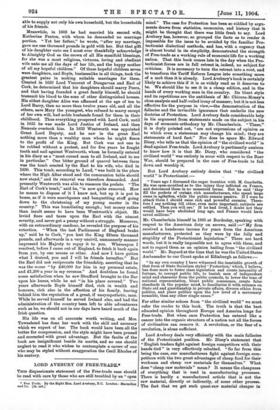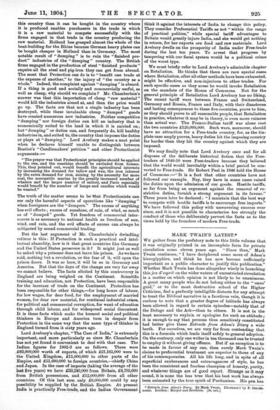• Free Trade. By the Right Hon. Lord Avebury, P.C.
London : Macmillan and Co. [58. net.]
might be thought that there was little fresh to say. Lord Avebnry has, however, so grouped the facts as to render it impossible for the issue to be avoided by the familiar Pro- tectionist dialectical methods, and has, with a cogency that is almost brutal in its simplicity, demonstrated the strength of Free-trade as a working rule of economic life for a working nation. That this book comes late in the day when the Pro- tectionist forces are in full retreat is, indeed, no subject for criticism. It is necessary to turn the retreat into a rout, and to transform the Tariff Reform League into something more of a mob than it is already. Lord Avebury's book is certainly likely to achieve this if it is as widely read as it deserves to be. We should like to see it in a cheap edition, and in the hands of every working man in the country. Its blunt style and its repetitions are the antithesis of Mr. Chiozza-Money's close analysis and half-veiled irony of manner; but it is not less effective for the purpose in view,—the demonstration of the fallacies and the invincible ignorance that underlie the new doctrine of Protection. Lord Avebury finds considerable help in his argument from statements made on the subject in his days of economic orthodoxy by Mr. Chamberlain. "These," it is dryly pointed out, "are not expressions of opinion as to which even a statesman may change his mind; they are statements of hard fact." Nor does he spare Mr. Edward Dicey, who tells us that the opinion of "the civilized world" is. dead against Free-trade. Lord Avebury is pertinently anxious to know how it is that Mr. Dicey, who considered "the civilized world" was entirely in error with respect to the Boer War, should be prepared in the case of Free-trade to fall down and worship it.
But Lord Avebury entirely denies that "the civilized world" is Protectionist :—
"Years ago I discussed the sugar bounties with M. Gambetta. He was open-mouthed as to the injury they inflicted on France, and denounced them in no measured terms. But he said they fill the pockets of certain rich manufacturers, who spend large sums in agitation, while the public remain passive. If I were to attack them I should raise rich and powerful enemies. There- fore I say nothing till other, even more important, subjects are settled. Then you will see.' If he had lived, I doubt not they would have been abolished long ago, and France would have saved millions."
Mr. Chamberlain himself in 1885 at Bordesley, speaking with respect to the American duty on screws, said :—" My firm received a handsome income for years from the American. manufacturers, protected as they were by the folly and stupidity of the Protectionist legislation." These are hard words, but it is really impossible not to agree with them, and not to regard them as an opinion hailing from "the civilized world." Mr. Bayard at the time that he was the United States Ambassador to our Court spoke at Edinburgh as follows:—
"In my own country I have witnessed the insatiable growth of that form of State Socialism styled Protection,' which, I believe,. has done more to foster class legislation and create inequality of fortune, to corrupt public life, to banish men of independent mind and character from the public councils, to lower the tone of national representation, blunt public conscience, create false- standards in the popular mind, to familiarise it with reliance on. State aid and guardianship in private affairs, divorce ethics from politics, and place politics upon the low level of a mercenary scramble, than any other single cause."
For other similar echoes from "the civilized world" we must. refer the reader to this book. The truth is that the best educated opinion throughout Europe and America longs for
Free-trade. But when once Protection has entered like a cancer into the organic structure of a nation not all the forces. of civilisation can remove it. A revolution, or the fear of a.
revolution, is alone sufficient.
Lord Avebury deals very efficiently with the main fallacies. of the Protectionist position. Mr. Dicey's statement that, "English traders fight against foreign competitors with their hands tied" is very effectively rebutted. "So far from this being the case, our manufacturers fight against foreign com- petitors with the two great advantages of cheap food for their
workmen and cheap raw materials for themselves." What. does "cheap raw materials" mean? It means the cheapness of everything that is used in manufacturing processes.
There is hardly a manufactured article that is not the raw material, directly or indirectly, of some other process.
The fact that we get such quasi-raw material cheaper in it is a raw material to compete successfully with the firms engaged in that trade in the country producing the raw material. Holland has grasped almost the whole of the boat-building for the Rhine because German heavy plates can be bought cheaper in Holland than in Germany. The most notable result of " dumping " is to ruin the "finished pro- duct" industries of the " dumping " country. The British firms engaged in the production of steel "finished products" require all the steel and pig-iron they can get from abroad. The most that Protection can do is to "benefit one trade at the expense of another," to the injury of "the country as a whole." Indeed, the complaint against " dumping " is absurd. If a thing is good and socially and commercially useful, as well as cheap, why should we complain ? Mr. Chamberlain's answer was that this importation of cheap "raw material" would kill the industries aimed at, and then the price would go up. The facts are that not a single industry has been destroyed, while these invaluable cheap " dumped " goods have created numerous new industries. Neither competitive " dumping " nor foreign duties can kill an industry that is economically suited to the land in which it is carried on; but" dumping" or duties can, and frequently do, kill healthy industries in, and suited to, the country that imposes the duties or plays at "dumping." Lord Avebury makes a neat point when he declares himself unable to distinguish between Bastiat's " Candlemakers' petition" and other Protectionist arguments :—
"The prayer was that Protectionist principles should be applied to the sun, and the sunshine should be excluded from houses. This, they pointed out, would benefit the agricultural interests by increasing the demand for tallow and wax, the iron interest by the extra demand for iron, mining by the necessity for more coal, the mercantile marine by the greatly increased number of whalers and the larger number of sailors, and Paris especially would benefit by the number of lamps and candles which would be wanted."
The truth of the matter seems to be ttliat Protectionists can see only the harmful aspects of operations like " dumping " when foreigners are the "dumpers." The excess of anything has evil effects ; excess of sunshine, of rain, of wind, as much as of " dumped " goods. Yet freedom of commercial inter- course is as necessary to national health as freedom of sun, wind, and rain, and the evil effects of excess can always be mitigated by sound commercial trading.
But the last argument of Mr. Chamberlain's dwindling retinue is this : If Protection is such a practical and intel- lectual absurdity, how is it that great countries like Germany and the United States persevere in it ? It might just as well be asked why a prisoner does not leave his prison. As we have said, nothing but a revolution, or the fear of it, will open the prison doors. It was so here, it will be so in Germany and America. But that the days of the change are very far away we cannot believe. The facts elicited by this controversy in England are being weighed on the Continent. Scientific training and education, not Protection, have been responsible for the increase of trade on the Continent. Protection has been responsible for other things,—for long hours of labour, for low wages, for dear food, for the employment of married women, for dear raw material, for continual industrial crises, for political and commercial corruption, for want of education through child labour, and for widespread social discontent. It is these facts which make the keenest social and political thinkers in Europe and America turn in despair from Protection in the same way that the same type of thinker in England turned from it sixty years ago.
Lord Avebury's chapter, "The Case of India," is extremely important, and more particularly so since Mr. Chamberlain has not yet found it convenient to deal with that case. The Indian figures for 1902-3 are as follows. There were £83,900,000 worth of exports, of which £21,165,000 were to the United Kingdom, 211,000,000 to other parts of the Empire, and £51,690,000 to foreign countries,—chiefly China
and Japan. In the case of imports (taking the average of the last five years) we have £33,240,000 from Britain, £4,785,000 from British possessions, and £12,000,000 from all other
countries. Of this last sum only £8,000,000 could by any possibility be supplied by the British Empire. At present India is practically Free-trade, and the Indian Government think it against the interests of India to change this policy.. They consider Preferential Tariffs as not "within the range of practical politics," while special tariff advantages to Britain would greatly injure India, and she would get nothing in return, for her exports are food and raw materials. Lord Avebury dwells on the prosperity of India under Free-trade during the last ten years. To arrest that progress by tampering with our fiscal system would be a political crime of the worst type.
We must briefly refer to Lord Avebury's admirable chapter on Retaliation. He thinks that there are rare special cases where Retaliation, after all other methods have been exhausted, might be effective, and non-injurious to other trades. For such specific cases as they arose he would invoke Retaliation on the mandate of the House of Commons. But for the general principle of Retaliation Lord Avebury has no liking. The recent tariff wars between France and Switzerland, Germany and Russia, France and Italy, with their disastrous and lasting consequences to these five countries, prove to him, as they should prove to all reasonable people, that Retaliation in practice, whatever it may be in theory, is even more ruinous than actual war. The Franco-Italian tariff war alone cost the two countries £120,000,000. Such wars, moreover, should have no attraction for a Free-trade country, for, as the tin- plate case amply proves, heavy duties bit the imposing country far harder than they hit the country against which they are imposed.
We may finally note that Lord Avebury once and for all disposes of the deliberate historical fiction that the Free- traders of 1840-50 were Free-traders because they believed that the world would inevitably within a brief period be con- verted to Free-trade. Sir Robert Peel in 1846 told the House of Commons :—" It is a fact that other countries have not followed our example. Nay, they have in some cases raised the duties upon the admission of our goods. Hostile tariffs, so far from being an argument against the removal of re- strictive duties, furnish a strong argument in its favour?' Three years later he declared : "I maintain that the best way to compete with hostile tariffs is to encourage free imports?' We have followed this policy with unwavering success ever since, and it is not possible to chara,cterise too strongly the conduct of those who deliberately pervert the facts as to the views held by the founders of modern Free-trade.











































 Previous page
Previous page